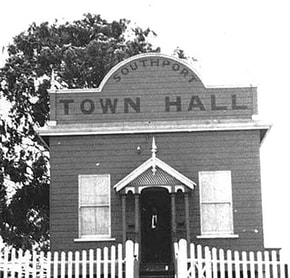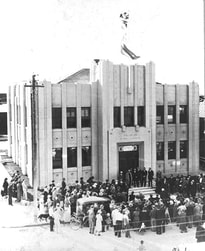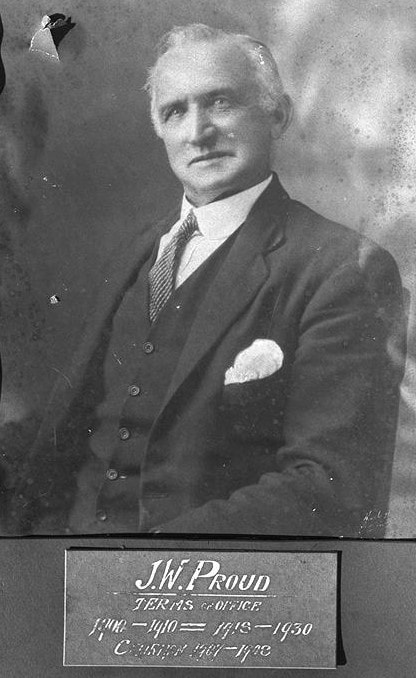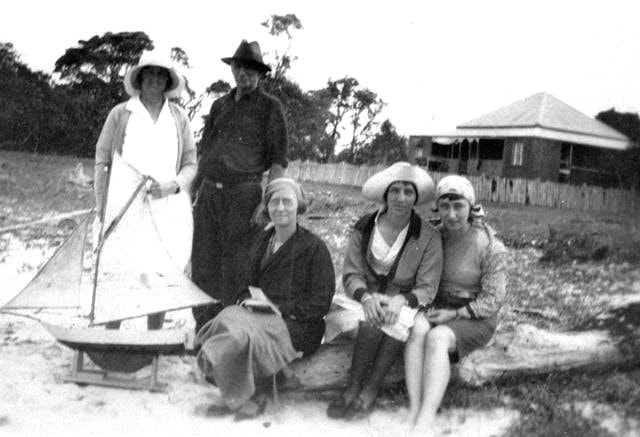Joseph Wood Proud
Mayor of Southport 1935-1949
By Margaret Deacon
| Joseph Wood Proud was born on December 29, 1870 to Jonathan and Barbara (Wood) Proud in Ulverstone, Lancashire, England. His parents, together with nine children, departed aboard the Duke of Buccleuch from Plymouth, England arriving in Brisbane on 6 November 1883. The family lived in Brisbane, Gatton and Indooroopilly prior to arriving in Southport in 1887 to take up selections of swampy land for raising dairy cattle. Joseph was interviewed in 1937 in connection with the “Back to Southport Carnival” to be held in the near future. He said “I arrived in Southport fifty years ago last February, the morning after the Scottish Prince came ashore. At that time the bar was right opposite the Pacific Hotel or approximately on the outside of Porpoise Point”. The Scottish Prince ran aground on the south end of Stradbroke Island off Southport on February 3, 1887, indicating that the family arrived in Southport on 4 February 1887. The horse and cart journey from Laidley took many days. Joseph’s father built a colonial homestead overlooking the Broadwater for his family in 1893 and called it “Hollywell” after his old home in England. In 1875-acre allotments were being sold at between five pounds and fifteen pounds at a time when residents numbered about 30. |
 Southport Town Council Hall, 1919
Southport Town Council Hall, 1919 Joseph married Margaret Gillooly in 1892. He became involved in local politics in 1900 and was the youngest Alderman of the Southport Shire Council at the age of 29. The Council members met in the Southport Divisional Board Hall; a building constructed in 1899. In 1919 the Rolls indicated their residence in Southport at Pine Ridge, and Joseph was an Oyster Bank Proprietor. This was his stated occupation in the Electoral Rolls until 1949 while living at Hollywell, Broadwater.
Joseph and Margaret had 6 children, Margaret (Peggy), Elizabeth (Betty), Dorothy (Dorry), Cissy, James (Jim) and William (Bill). Peggy recalls her father’s boat, Myostis, the wonderful days spent on the Broadwater and picnicking on Stradbroke Island. His wife, Margaret, died on 31st August 1930 at the age of 63 after a long illness.
In 1914 with the formation of the Southport Town Council, development directions focused on tourism. The Town of Southport was declared on April 12, 1918 with E. Hicks, a Benowa farmer appointed the first Mayor and J.W. Proud, one of eight Aldermen.
The Southport Town Council elections were held in July 1921 and nominations were received for Mayor and Aldermen. Joseph Wood Proud was one of three to nominate for Ward 3. The others were Headry Grice and John Siganto. Washington Waters served as Mayor from 1919 until 1925.
In 1934 Joseph Proud married Mary Ann Shea, the widowed daughter of John and Elizabeth Siganto who owned ‘Finis’, a house at Lands End. John Siganto had built this home as a holiday house in 1914 and were neighbours of the Proud Family. Margaret recalled the Proud children walking 4 kms through the scrub to their school at Pine Ridge and that they ‘crossed swamps, stopped to admire beautiful wild orchids, startled wallabies and kangaroos and negotiated ti-tree bridges’.
 Photograph of Southport Town Hall Opening Ceremony 1935
Photograph of Southport Town Hall Opening Ceremony 1935 A special meeting of the Southport Town Council was held on 9th September 1935 when nominations were called for the office of Mayor following the resignation of Mayor H.J. Wilson on 28 July. Two nominations were received from Alderman Joseph Wood Proud and Alderman Washington Waters. Three votes were received for each candidate in a ballot. The candidates did not wish to draw for the position and the decision was made by a Governor in Council and Mayor Proud was appointed.
Joseph Wood Proud was elected Mayor on 4th April 1936, 22nd April 1939, 1st May 1943 and 27th April 1946. Joseph’s daughter, Margaret remembers ‘the hoo-ha of election day, which brought to mind how dedicated my father was to his work’. The election of April 1939 signified the overwhelming support which J. W. Proud enjoyed. The Mayoral position was never in doubt. J.W. Proud was returned for a second term by a 3 to 1 majority over his opponent Mr J. Shepherd.
Subsequent to the outbreak of War it was recommended by the Southport Control Committee to Mayor Proud and the Council that Air Raid precautions be implemented in the town. Air raid warnings were tested and the Southport Fire Brigade requested of Mayor Proud and the Council that volunteers under the age of 18 and over 45 years be sought and trained in fire-fighting in the event of an air raid. Later in the war in 1942 the Commonwealth Government requested that Shire Councils remove street signage from coastal areas along the east coast of Australia for 100 miles inland to prevent the enemy (Japanese) from obtaining information from them.
The Southport Town Council met fortnightly until it was changed to monthly meetings on 14 August 1940. Matters before the Council included rate charges, infrastructure repairs (e.g. to the pier and baths), water sampling, sand pumping/silting of the Broadwater, the proposed aerodrome at Biggera Waters, electricity services and the extension of power lines, as well as addressing letters to Council. Mayor Proud attended various Board meetings including the Southport Fire Brigade, Southport Water Board and the Southport Publicity Committee. He was chairman of the Southport Patriotic Committee during the War.
Joseph Wood Proud was elected Mayor on 4th April 1936, 22nd April 1939, 1st May 1943 and 27th April 1946. Joseph’s daughter, Margaret remembers ‘the hoo-ha of election day, which brought to mind how dedicated my father was to his work’. The election of April 1939 signified the overwhelming support which J. W. Proud enjoyed. The Mayoral position was never in doubt. J.W. Proud was returned for a second term by a 3 to 1 majority over his opponent Mr J. Shepherd.
Subsequent to the outbreak of War it was recommended by the Southport Control Committee to Mayor Proud and the Council that Air Raid precautions be implemented in the town. Air raid warnings were tested and the Southport Fire Brigade requested of Mayor Proud and the Council that volunteers under the age of 18 and over 45 years be sought and trained in fire-fighting in the event of an air raid. Later in the war in 1942 the Commonwealth Government requested that Shire Councils remove street signage from coastal areas along the east coast of Australia for 100 miles inland to prevent the enemy (Japanese) from obtaining information from them.
The Southport Town Council met fortnightly until it was changed to monthly meetings on 14 August 1940. Matters before the Council included rate charges, infrastructure repairs (e.g. to the pier and baths), water sampling, sand pumping/silting of the Broadwater, the proposed aerodrome at Biggera Waters, electricity services and the extension of power lines, as well as addressing letters to Council. Mayor Proud attended various Board meetings including the Southport Fire Brigade, Southport Water Board and the Southport Publicity Committee. He was chairman of the Southport Patriotic Committee during the War.
The war years of 1939-1945 were demanding times for Mayor Proud and his Council. Many committees were established to support the war effort in numerous ways. The Mayor urged citizens to participate in a patriotic rally at the Diggers Memorial Hall to mark the anniversary of the declaration of war. He indicated that ‘resolutions of loyalty will be submitted and there will be vocal and musical items. The Lady Mayoress was involved in the Southport Defence Council Comforts Fund, Patriotic Concerts, Red Cross, the CWA and the Union Jack Soldiers Club. Significant efforts were expended in raising funds to support families in need and goods were collected or crafted to be sent to the AIF on the Home Front.
A request by the Southport Ratepayers Association to the Town Council in August 1940 to seek a reduction in rates for those who were struggling financially was denied due to the Council experiencing fiscal pressures. Another review in February 1941 led to a decision to grant ratepayers engaged in War service a remission of rates for the duration of the war and for the following 12 months after the War. The state of Council finances had been an issue for many years as it struggled to meet the demands of maintenance, infrastructure as well as wartime defence expenditure.
Margaret Proud remembers their home, Hollywell being sold during World War Two because petrol rationing made it difficult for her father to travel to and from Southport for council work. Petrol rationing was introduced in Australia in late 1940 and early 1941, but was not strictly enforced until 1942. Food production was declining in Australia and rationing of food-stuffs including tea (an issue of 1/2 lb tea every 5 weeks) continued.
The amalgamation of three Town Councils (Southport, Nerang and Coolangatta) took place in the elections of May 1949 and Mayor Proud nominated as one of the six candidates. At the age of 78 he believed he had the energy and will to contest the position of Mayor of the Town of South Coast but it could be suggested that his age did not work in his favour. Alderman Len Peak, of Coolangatta secured an overwhelming majority and was appointed Mayor.
His death at the age of 81 on 11th January 1952 at his home on Marine Parade heralded the end of a life of enormous achievement. Joseph Wood Proud made a significant contribution to his community where his public and civic duties throughout his career as Councillor and Mayor dominated his life. He earned the respect of the community through his dedication and his
accomplishments especially during wartime when financial resources were scant. However, he managed to harness the support and cooperation of the public to raise funds for numerous causes during that time. Joseph Proud had a conciliatory approach in his leadership style thus gaining the respect of his fellow Councillors.
A request by the Southport Ratepayers Association to the Town Council in August 1940 to seek a reduction in rates for those who were struggling financially was denied due to the Council experiencing fiscal pressures. Another review in February 1941 led to a decision to grant ratepayers engaged in War service a remission of rates for the duration of the war and for the following 12 months after the War. The state of Council finances had been an issue for many years as it struggled to meet the demands of maintenance, infrastructure as well as wartime defence expenditure.
Margaret Proud remembers their home, Hollywell being sold during World War Two because petrol rationing made it difficult for her father to travel to and from Southport for council work. Petrol rationing was introduced in Australia in late 1940 and early 1941, but was not strictly enforced until 1942. Food production was declining in Australia and rationing of food-stuffs including tea (an issue of 1/2 lb tea every 5 weeks) continued.
The amalgamation of three Town Councils (Southport, Nerang and Coolangatta) took place in the elections of May 1949 and Mayor Proud nominated as one of the six candidates. At the age of 78 he believed he had the energy and will to contest the position of Mayor of the Town of South Coast but it could be suggested that his age did not work in his favour. Alderman Len Peak, of Coolangatta secured an overwhelming majority and was appointed Mayor.
His death at the age of 81 on 11th January 1952 at his home on Marine Parade heralded the end of a life of enormous achievement. Joseph Wood Proud made a significant contribution to his community where his public and civic duties throughout his career as Councillor and Mayor dominated his life. He earned the respect of the community through his dedication and his
accomplishments especially during wartime when financial resources were scant. However, he managed to harness the support and cooperation of the public to raise funds for numerous causes during that time. Joseph Proud had a conciliatory approach in his leadership style thus gaining the respect of his fellow Councillors.

